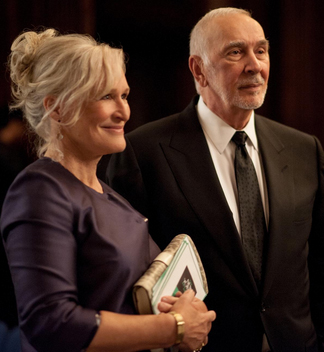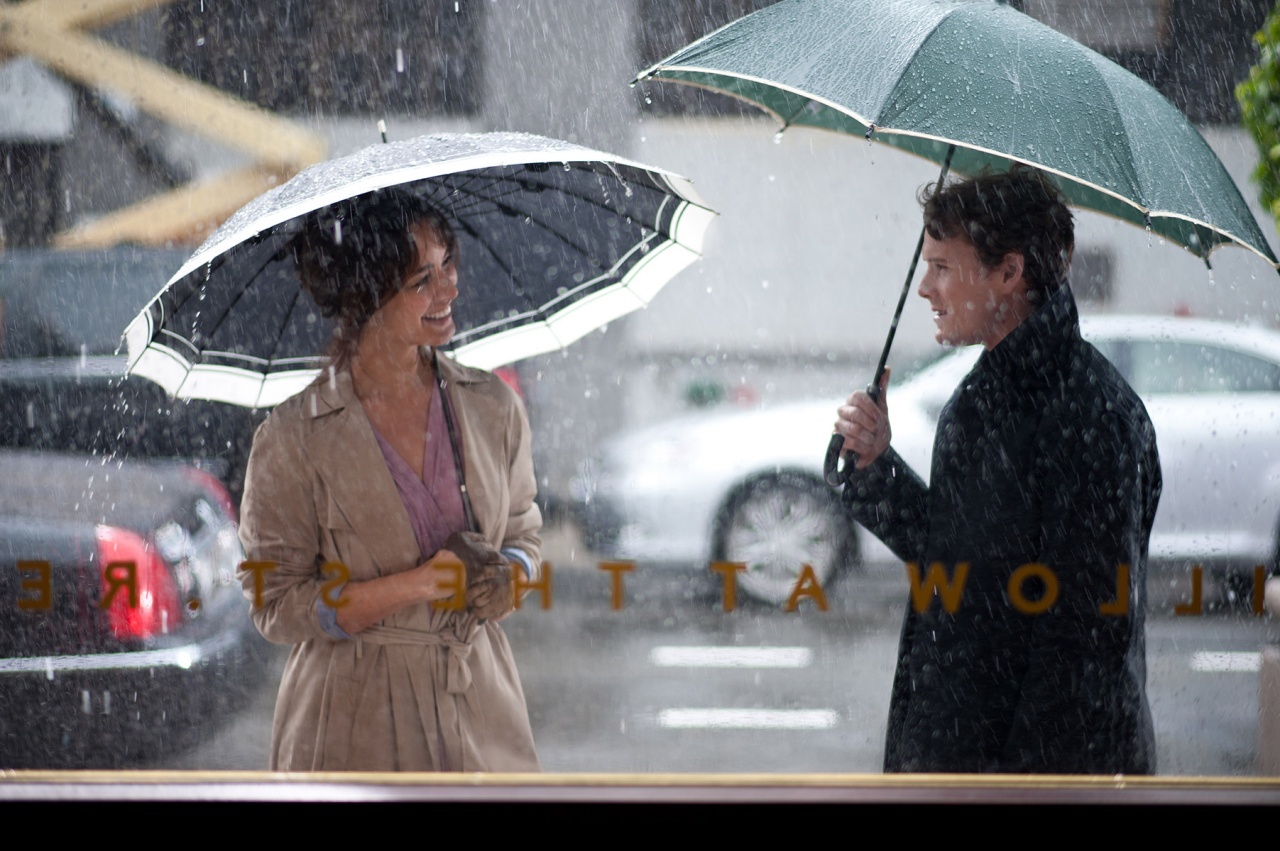Tribeca: "5 to 7," Or Why Frustrated Writers Should Back Away From Final Draft
 Thursday, April 24, 2014 at 9:01AM
Thursday, April 24, 2014 at 9:01AM
Tribeca coverage continues with Diana on 5 to 7 with Anton Yelchin & Glenn Close
 Based on the imaginings of an out-of-touch, middle-aged writer-director, 5 to 7 is about a 24 year-old “writer” (Anton Yelchin) who becomes involved with the 33 year-old wife of a French diplomat (Berenice Marlohe). Brian lives in Manhattan, presumedly on his parents’ dime (Glenn Close and Frank Langella, both painfully misused), and attempts to write, his creative juices facilitated by posting a multitude of rejection letters on his wall and playing lonely man wiffleball in his apartment. Arielle also lives in Manhattan and is oh so very “French” -- husband, two kids, posh neighborhood, and ability to balance high heels with a well-fitting dress.
Based on the imaginings of an out-of-touch, middle-aged writer-director, 5 to 7 is about a 24 year-old “writer” (Anton Yelchin) who becomes involved with the 33 year-old wife of a French diplomat (Berenice Marlohe). Brian lives in Manhattan, presumedly on his parents’ dime (Glenn Close and Frank Langella, both painfully misused), and attempts to write, his creative juices facilitated by posting a multitude of rejection letters on his wall and playing lonely man wiffleball in his apartment. Arielle also lives in Manhattan and is oh so very “French” -- husband, two kids, posh neighborhood, and ability to balance high heels with a well-fitting dress.
Spotting Arielle in front of the St. Regis, Brian pursues her through quips that sound more like early drafts of “wit” rather than the finished product (think Woody Allen without the neurotic charm). She tosses words back at him that are meant to signify mutual attraction. When they do end up in a hotel room together (after she hands him the key), there is zip chemistry between the pair, cringingly highlighted all-the-more when Arielle tells Brian that he is a natural lover and asks whether his other lovers had told him that. That’s the crux of the problem with this film - we are told things consistently through voiceover and character iteration (Brian loves Arielle, Arielle loves Brian, Brian’s mother can see that they love each other), but we’re rarely shown anything substantial enough to back up these assertions. [More...]

The film is littered with references to elite culture that we’re meant to gobble up as emblematic of sophistication and/or merit. After that St. Regis meeting, Arielle’s open-minded husband (played by Lambert Wilson of Matrix Revolutions and Of Gods and Men fame) invites Brian for dinner at their swanky apartment, with even swankier guests including his own 25 year-old mistress (Olivia Thirlby) who just so happens to be an editor at Farrar, Straus and Giroux. Not too long after this dinner of highbrow networking, Brian’s short story about two star-crossed dogs (Allegory!) winds up in The New Yorker. The story is apparently so exemplary that he lands a book deal (involving a brief encounter with Eric Stoltz). Location shots include The St. Regis, a Dior store and the Guggenheim. The name-dropping rarely ends, but to what end?
As a film nerd, the most grievous of these stabs at high culture was the use of clips from Jules et Jim. Yes, we get it, Arielle is like Catherine (French, beautiful, distant, involved with two men, etc.), but there are so many more applicable films and less cliché ways of referencing French cinema (seriously,the run on the bridge scene?). It feels insulting that the film never mentions Cleo from 5 to 7 in the midst of so many other throw-away references. If they wanted something applicable to the story at-hand, they could have easily turned to Billy Wilder’s Love in the Afternoon with Anton Yelchin as the Audrey Hepburn fresh-faced ingenue and Berenice Marlohe as the attractive French woman equivalent of the Gary Cooper’s worldly playboy, but nope.
Simply, 5 to 7 is the embodiment of pretension, lacking the wit, charm and subtlety necessary to pull off what could have been an amusing play of manners or an emotional romance or, better still, a combination of both. As many critics will jump to tell you, 5 to 7 gives writers a bad name and exemplifies the many pitfalls frustrated writers can fall into while writing a screenplay: all the pieces in place but jammed together improperly, telling not showing, grandiose plot leaps, referencing The New Yorker. (I write this as a frustrated 20-something writer who committed all of these sins as a 16 year-old screenwriting student.) D+



Reader Comments (3)
Telling-but-not-showing is my number one narrative pet peeve. That cast deserves better! Great review though.
I just finished watching Alex in Wonderland, Paul Marzursky's followup to his hit Bob & Carol & Ted & Alice. The movie concerns a director who's anxious about his followup to his last success. As Mazursky wrote both these movies, watching Alex in Wonderland left me with the feeling that the reviewer had of this new film: watching writers floundering for meaning often leads to stagnant cinematic narrative. At least AIW shows a self-deprecating awareness that lightens the story. Mazursky went on to greater things; time will tell with this other filmmaker.
I am perplexed by this movie. The Variety and Hollywood reporter reviews both saw it as a charming if lite romantic movie; all other reviews have been completely scathing of both premise and execution. If nothing else, I now have to see it to work out who I agree with.